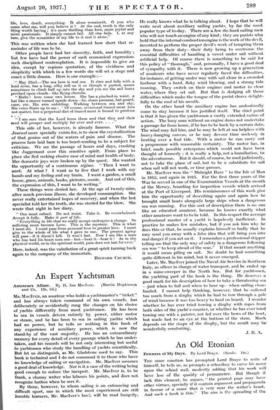An Expert Yachtsman
Mn. MAcIvEn, an amateur who holds a yachtmaster's "ticket" and has always taken command of his own vessels, has deliberately or accidentally rung the changes on his choice of yachts differently from most yachtsmen. He has been to sea in vessels driven entirely by power, either motor or steam, and he has been to sea in sailing yachts which had no power, but he tells us nothing in this book of any experience of auxiliary power, which _ is now the stand-by of the vast majority. He has an extraordinary memory for every detail of every passage which he has under- taken, and his ieemds will be not only interesting but useful to yachtsmen who study the handling of yachts scientifically. But let us distinguish, as Mr. Gladstone used to say. This book is technical and I do not commend it to those who have no knowledge of sailing or navigation. Mr. Maclver assumes a good deal of knowledge. Nor is it a case of the writing being good enough to seduce the inexpert. Mr. Maclver is, to be frank, a clumsy writer who labours his points, and does not recognize bathos when he sees it.
By those, however, to whom sailing is an entrancing and difficult sport, one in which the most experienced are still humble learners, Mr. Maclver's bock will be read hungrily.
He really knows what he is talking about. I hope that he will write next about auxiliary sailing yachts, by far the most popular type of to-day. There are a few die-hard sailing men who will not touch an engine of any kind ; they are purists who hold that the internal combustion engine is the work of the devil, invented to perform the proper devil's work- of tempting them away from their duty—their duty being to overcome the essential difficulties of handling a vessel under sail without artificial help. Of course there is something to be said for this policy of "thorough," and, personally, I have a good deal of sympathy with it. There is now growing up a generation of amateurs who have never regularly faced the difficulties, for instance, of getting under way with sail alone in a crowded harbour with a hard, fluky wind blowing, and a strong tide running. They switch on their engines and motor to clear water, where they set sail. But that is dodging all those difficulties which make the tongue of the purist cleave delight- fully to the roof of his mouth.
On the other hand the auxiliary engine has undoubtedly come to stay because it has justified itself. The chief point is that it has given the yachtsman a vastly extended radius of action. The busy man without an engine dares not undertake a passage far from home, if he has to be back by a certain date. The wind may fail him, and he may be left at sea helpless with heavy-hanging canvas, or he may devour time uselessly in beating over a foul tide. With a motor he can carry out a programme with reasonable certainty. The motor has, in brief, made possible enterprises which could not have been thought of formerly ; it is really a help, not a humiliation, to the adventurous. But it should, of course, be used judiciously, not to take the place of sail, but to be a substitute for sail when sail will not work, or time presses.
Mr. Maclver won the " Midnight Race " to the Isle of Man in 1912, and again in 1925. For the first three years of the War lie served in one of the Examination Vessels at the mouth of the Mersey, boarding for inspection vessels which arrived at the Port of Liverpool. His reminiscences of this work give him the opportunity of describing again and again how he brought small boats alongside large ships when a dangerous sea was running. For this sort of description there is no one like an educated amateur, because he knows exactly what other amateurs want to to be told. In this respect the average professional master of a yacht is hopelessly inefficient. In practice he makes few mistakes, but if you ask him why he does this or that, he usually explains himself so badly that he may send you away with a false idea that will bring you into real danger if you act on it. I remember a professional skipper telling me that the only way of safety in a dangerous following sea was " to keep ahead of the seas." If that meant anything it would mean piling on sail. No doubt he had something quite different in his mind, but it never emerged.
Later, Mr. Maclver joined the Naval Air Service in Southern Italy, as officer in charge of water transport, and he ended up in a mine-sweeper in the North Sea. But for yachtsmen, the yachting part of time book is the thing. He deserves a good mark for his description of how to take a threatening sea —just when to luff and when to bear up—when sailing close- hauled. I cannot help thinking, however, that he suffered too much from a dinghy which he had to tow through a gale. of wind because it was too heavy to haul on board. I wonder_ whether he has ever tried towing a dinghy with ropes from both sides of the yacht's counter, or whether he has ever tried towing one with a painter, not led over the bows of the boat, but made fast to an eye at the bottom of the stem. Much depends on the shape of the dinghy, but the result may lies: wonderfully comforting.
J. B. A.


































 Previous page
Previous page